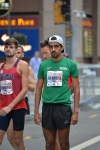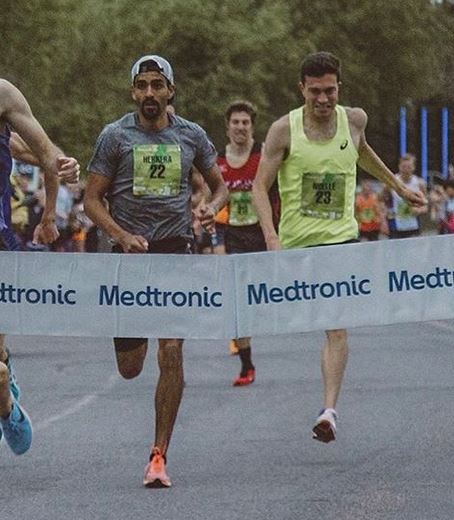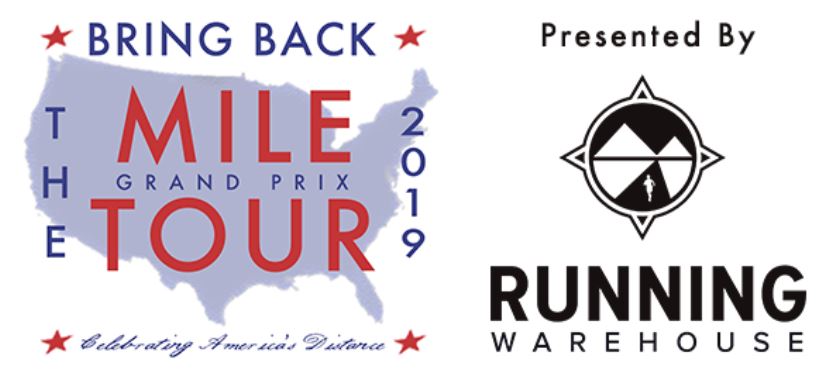Meet the Miler: Daniel Herrera

SoCal native and 2018 BBTM GP Tour champion: "You find out that the chip on the shoulder type mentality can only take you so far."
By David Monico, Bring Back the Mile
Daniel Herrera, 26, is a rising star in the Mile ranks. In 2018, Herrera, with consistent racing, won the men's BBTM Grand Prix Tour title and begins his Tour defense at Tuesday's Grand Blue Mile in Des Moines, Iowa. BBTM recently sat down with Herrera, a UCLA grad, to learn more about his running career, his training and his goals.
BBTM: You are currently living and training in the distance running mecca of New Orleans. What brought you there to The Big Easy?
Herrera: (laughs) After UCLA, I went up to Portland to live and train and my girl friend was nice enough to follow me up there. She then got into medical school at Tulane and told me, "I have to be there for orientation next week." And I was like, "All right you go do that, I'll figure things out here in Portland." And then a few months later I moved out. I spoke to Scott Smith (NAZ Elite member) at the Portland Track Festival who was in a similar situation and he gave me good advice around making sacrifices.
For those of us from the west coast who don't know anything beyond our neck of the woods, what's the running scene like in New Orleans?
This past weekend the running scene was great. It was the Crescent City Classic, so there was tons of people here. On a regular week though it's a small community, especially in terms of elite runners training here.
Most people think of New Orleans and just think party. I'm a pretty boring person in the traditional sense of what a 20-something-year-old in New Orleans would do. It's kind of hard to enjoy all those festivities when you're training pretty hard, and working, and balancing everything out. And not to mention my girl friend studying all the time. So it actually helps that the two of us don't really have a lot of time for that.
Also, in Portland we had the "dark months" when it's raining all the time. Down here in New Orleans it's fantastic; it's great running weather until June when it really starts to get hot and very humid. Those summer months are impossible to train here, but during that time of year I'm in Portland or traveling around to race.
One of my conditions for moving here was that we had to be really close to a city park. I have a track nearby to train on and we've got a lot more room here than we did in Portland; I converted a shed into a gym. It's been working out; I like it.
I remember at UCLA the tiniest little two bedroom, paying an absurd amount of money, I then go to Portland paying the same amount of money and getting a nice place, and then coming here, and it's like, "Wow, yeah, this is different. This is different."
The impression of training in and around UCLA is that you essentially run up and down boulevards. You've been moving up every since.
(Laughs) Credit to Coach (Forest) Braden we had an area where we would do a tempo run that was a road. It was a hilly, up for one mile and then downish for the other mile, figure eight loop with no stops or anything like that. We also had San Vincente Boulevard which is a big part of the LA Marathon and the Intermural Sports Field on a soft surface, which was 600-800 meters around.
But, I've never had the issue of needing a new place to run. I'm a two or three routes tops type of guy, which is why I like it where I'm at in New Orleans. I run one of two routes from my house all the time and the other days I'm on the track. I'm just fine with that.
Do you feel that was instilled in you being raised in Pico and running at El Rancho High School? You guys have had some incredible teams over the years without having trails right outside your doorstep.
Exactly. I think you're spot on with that. There was definitely some people that would try to diversify – "What if we do this loop here and go down this street." But, for the most part, it was like, "Okay, you go to this riverbed, and you run at that riverbed for this long, or you go to the west riverbed and you run there or you stay on the grass." I think that has a lot to do with my mentatility; we've always just kind of made do with what we had, and that was enough.
Where did your love of running come from?
I would say that at first playing that up-and-comer role, having a chip on the shoulder, was a big driving force. We didn't have attitude or much else to work with at Pico so we all had this attitude that we've got to go out there and prove it. We're just a couple kids from a largely predominant Hispanic neighborhood that has to go out there and do something big in the world type of thing.
I think I took that to Cerritos College where it was, "Oh, I'm a junior college kid, but I'm going to race the D1 kids" and I felt I was equal or better than them. Then at UCLA I definitely struggled a bit with that because of that "Oh, I've made it" feeling. It didn't click for me right away and there was one day in particular where I recall finishing some sort of a time trial and telling my teammate, "Hey, we suck. We're running 3:44, 3:45 and I know that what has been good, but it's not good enough anymore." That gave me that chip on the shoulder again.
Now I like where I'm at more. It's evolved and I definitely struggled with it in my first year out of college was like, "Oh, I need to prove myself." But, when you're proving yourself against the very best that the U.S. has to offer or globally, you find out that the chip on the shoulder type mentality can only take you so far. It's shifted now to viewing it in a different light and I think a lot more like a craft. Even the training runs are part of building this craft, this experience that I really love, being at the track, training hard and racing hard.
How did you get started with Jonathan Marcus and High Performance West?
Originally I just wanted to move to Portland and Coach Braden continued to coach me. J Mar was there from the beginning offering advice and helping out in person when he could. It evolved into a great relationship and a guy I wanted in my corner.
Last year you really embodied the notion that you don't need to be in this peaking cycle, but can compete all year along at a high level.
Yeah, I raced or was a rabbit 30 times. I would race to 1500 and then pace the 5K a day after. Fun stuff. Not every single race was like, "Oh, I'm fresh," and you know I did a light 200 workout before this." A lot of of my races I would train through and learn.
Returning to the craft thing, that's how I view a lot of the racing. A lot of the racing is building this craft, getting new tools, seeing what works, what doesn't work, and so it's preparing us for the next one and for the bigger ones down the road. I think that's a big reason why we were doing that; it has allowed me to grow. Since I wasn't an NCAA champion or even made an NCAA final I needed to make all of this and my competitors normal; that I could compete with them.

We focused on the Tour from the get go in 2018. I wanted to run all the road Miles. Two years ago it was all about trying to break the Mexican outdoor Mile record, which I was fortunate to get at the Adrian Martinez Classic. I had run a bunch of 3:39s and 3:40s for 1500 and I knew with (Leo) Manzano (Kyle) Merber and some of the others in that field that it would take a 3:56 to be in the mix. I was still a little bit timid in my approach to racing, but it was starting to evolve from, "Okay, I'm not just content with being in this pack; I gotta pass you; I don't care that you're an Olympic silver medalist, but I need to try to get around you". I didn't end up catching Kyle, but that race pushed me to my 3:56.
I had such a good time running the Mile I knew I could compete well on the roads. I've`talked to people with really solid track backgrounds and have that feeling that the road is not for them. It's so tactical and you never know what you're going to get. That's something that I really like about the road; it really is a pure race.
It also has some fond memories for me–we used to have at El Rancho these easy runs and it's all roads around there; there's no great trails. We'd race back to the parking lot of the school from a random point someone would just press. Now we're going all out back to the parking lot. And we just knew that was the race, like back to the gate. And sometimes it was 400 meters out probably, and sometimes it was 600, and 800 and some ridiculous moves. It was pure, fun and enjoyable. I really have come to love that about the roads.
Last year at the Grand Blue Mile you were an "up-and-comer". Nobody had you on the radar to be in the mix to win. You're more of a known quantity now. How does that shift your objectives heading into this year's Grand Blue Mile?
I definitely want to come away with having put myself in the mix to when, which is something that I'll openly say, I've struggled with. I mentioned earlier that out of college I had that "Oh, I'm just so happy to be in this field mentality". The roads has been a really big equalizer for me where I don't view it as, "Oh, I'm happy to be in this field." So I think putting myself in a really good position to win it and then see how the cards fall is the goal. If I can do everything in my power and end up winning, fantastic. If I do everything in my power and end up second or third, still fantastic. But I want to give myself that and an opportunity for a really big win.
Are you planning on racing a lot again this year?
Still quite a bit, but not as many as last year. I love racing, but I do think it was very much a learning experience to put myself in different situations. However, I won't turn down a good race if the opportunity presents itself. I'm hoping we get it down to 20 though, the traveling is really taxing and you miss home.
Along with honing in your craft as an athlete, what else drives you off the track?
I'm in a situation where I'm not sponsored and work full-time, but that has actually given me the ability to stay in the craft. Especially in fields like the arts you hear of people moonlighting to allow themselves to work on what they're passionate about. I'm lucky that I enjoy my job with a hospital system in Oregon and I get to work remotely.
I make running a priority right now because that window is a lot smaller. With my job I can keep playing this game and that's really important. If there's one big message I could get across to younger athletes is to put yourself in a position to stay in the game. You can say having this job is a detriment, but there are artists, writers, musicians, you name it who operate similarly. I've given myself the financial stability to have done this for the past couple of years. I can keep getting on starting lines, keep playing, keep working on the craft and keep improving.
You see a lot of people flame out after college because they have this mentality of wanting to do this for one or two years, get a contract and go from there. But, if you weren't good enough to get a big contract out of college you still have a lot of skills you need to develop and you typically don't go from "I can't get a contract to being a world beater" in one or two years; that's a daunting task. People sell themselves short two years in. I'd love to help others see this as a normal thing to do out of college.
Someone like Riley Masters, to his credit, has a job and works quite a bit to my understanding. It gives him that ability to play the game and view it as like, "I can do this for a long time as long as I keep getting opportunities." I think that gives you a little bit more openness to really explore.
Good luck on Tuesday at Grand Blue, Daniel.
Thank you.

